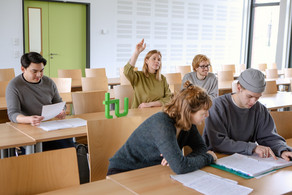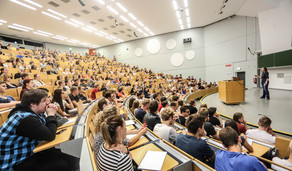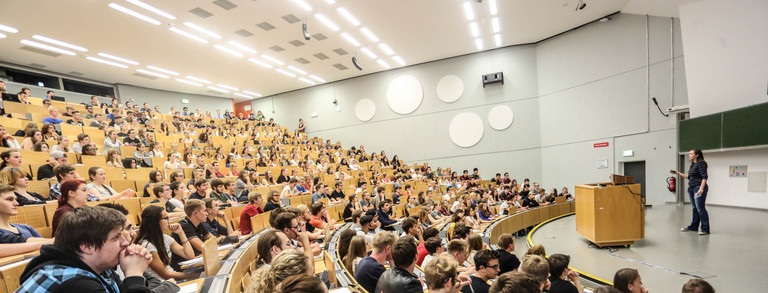AI Colloquium
The AI Colloquium is a series of lectures dedicated to cutting-edge research in the field of machine learning and artificial intelligence, coorganized by the Lamarr Institute for Machine Learning and Artificial Intelligence (Lamarr Institute), the Research Center Trustworthy Data Science and Security (RC Trust), and the Center for Data Science & Simulation at TU Dortmund University (DoDas).
Programme
Distinguished researchers deliver captivating lectures followed by vibrant discussions. However, unlike traditional colloquia, the AI Colloquium prioritizes interactive dialogue, fostering international collaboration. Conducted primarily in English, these 90-minute sessions feature hour-long lectures and 30-minute Q&A sessions. Join every Thursday at 10 AM c.t. for a stimulating exploration of cutting-edge topics. Whether in-person at our Lecture Room on Fraunhofer Strasse 25 or via Zoom, our hybrid format ensures accessibility for all.
| Day (usually) | Thursday |
| Start and end time | 10 AM c.t. - 12 AM |
| Duration of Presentation | 60 Minutes |
| Location (usually) | Lecture Room 303 3. Floor Fraunhofer Strasse 25 Dortmund |
Upcomming Events
Zukunft der Künstlichen Intelligenz
- RC Trust

Prof. Dr. Kristian Kersting

Bio. Kristian Kersting is a Full Professor (W3) at the Computer Science Department of the TU Darmstadt University, Germany. He is the head of the Artificial Intelligence and Machine Learning (AIML) lab, a member of the Centre for Cognitive Science, a faculty of the ELLIS Unit Darmstadt, and the founding co-director of the Hessian Center for Artificial Intelligence (hessian.ai). After receiving his Ph.D. from the University of Freiburg in 2006, he was with the MIT, Fraunhofer IAIS, the University of Bonn, and the TU Dortmund University. His main research interests are statistical relational artificial intelligence (AI) as well as deep (probabilistic) programming and learning. Kristian has published over 200 peer-reviewed technical papers, co-authored a Springer book on Statistical Relational AI and co-edited a MIT Press book on Probabilistic Lifted Inference. Kristian is a Fellow of the Association for the Advancement of Artificial Intelligence (AAAI), a Fellow of the European Association for Artificial Intelligence (EurAI), a Fellow of the European Laboratory for Learning and Intelligent Systems (ELLIS), and a key supporter of the Confederation of Laboratories for Artificial Intelligence in Europe (CLAIRE). He received the Inaugural German AI Award (Deutscher KI-Preis) 2019, accompanied by a prize of EURO100.000, several best paper and outstanding reviewer awards, a Fraunhofer Attract research grant with a budget of 2.5 Million Euro over 5 years (2008-2013), and the EurAI (formerly ECCAI) Dissertation Award 2006 for the best PhD thesis in AI. for the best Ph.D. thesis in the field of Artificial Intelligence in Europe.
Kristian co-chaired the scientific program committee (PC) of ECML PKDD 2013, UAI 2017, ECML PKDD 2020, and the AAAI 2021 Focus Area on Neuro-Symbolic AI. He was the General Co-Chair of UAI 2018 and an Associate PC Co-Chair of AAAI 2024. He served as a Councillor of the Association for the Advancements of Artificial Intelligence (AAAI), 2022-2025, and regularly serves on the PC (often at senior level) of several other flagship AI and ML conferences, co-chaired several international workshops, cofounded the international workshop series on Statistical Relational AI (StarAI) and gave several tutorials at flagship AI and ML conferences, He was the founding Editor-in-Chief of Frontiers in Machine Learning and AI and is (past) action editor of IEEE Transactions on Pattern Analysis and Machine Intelligence (TPAMI), Journal of Artificial Intelligence Research (JAIR), Artificial Intelligence Journal (AIJ), Data Mining and Knowledge Discovery (DAMI), and Machine Learning Journal (MLJ) as well as on the editorial board of KI, the German AI Journal.
Past Events
Zukunft der Künstlichen Intelligenz
- RC Trust

Prof. Dr. Kristian Kersting

Bio. Kristian Kersting is a Full Professor (W3) at the Computer Science Department of the TU Darmstadt University, Germany. He is the head of the Artificial Intelligence and Machine Learning (AIML) lab, a member of the Centre for Cognitive Science, a faculty of the ELLIS Unit Darmstadt, and the founding co-director of the Hessian Center for Artificial Intelligence (hessian.ai). After receiving his Ph.D. from the University of Freiburg in 2006, he was with the MIT, Fraunhofer IAIS, the University of Bonn, and the TU Dortmund University. His main research interests are statistical relational artificial intelligence (AI) as well as deep (probabilistic) programming and learning. Kristian has published over 200 peer-reviewed technical papers, co-authored a Springer book on Statistical Relational AI and co-edited a MIT Press book on Probabilistic Lifted Inference. Kristian is a Fellow of the Association for the Advancement of Artificial Intelligence (AAAI), a Fellow of the European Association for Artificial Intelligence (EurAI), a Fellow of the European Laboratory for Learning and Intelligent Systems (ELLIS), and a key supporter of the Confederation of Laboratories for Artificial Intelligence in Europe (CLAIRE). He received the Inaugural German AI Award (Deutscher KI-Preis) 2019, accompanied by a prize of EURO100.000, several best paper and outstanding reviewer awards, a Fraunhofer Attract research grant with a budget of 2.5 Million Euro over 5 years (2008-2013), and the EurAI (formerly ECCAI) Dissertation Award 2006 for the best PhD thesis in AI. for the best Ph.D. thesis in the field of Artificial Intelligence in Europe.
Kristian co-chaired the scientific program committee (PC) of ECML PKDD 2013, UAI 2017, ECML PKDD 2020, and the AAAI 2021 Focus Area on Neuro-Symbolic AI. He was the General Co-Chair of UAI 2018 and an Associate PC Co-Chair of AAAI 2024. He served as a Councillor of the Association for the Advancements of Artificial Intelligence (AAAI), 2022-2025, and regularly serves on the PC (often at senior level) of several other flagship AI and ML conferences, co-chaired several international workshops, cofounded the international workshop series on Statistical Relational AI (StarAI) and gave several tutorials at flagship AI and ML conferences, He was the founding Editor-in-Chief of Frontiers in Machine Learning and AI and is (past) action editor of IEEE Transactions on Pattern Analysis and Machine Intelligence (TPAMI), Journal of Artificial Intelligence Research (JAIR), Artificial Intelligence Journal (AIJ), Data Mining and Knowledge Discovery (DAMI), and Machine Learning Journal (MLJ) as well as on the editorial board of KI, the German AI Journal.
Zukunft der Künstlichen Intelligenz
- RC Trust

Prof. Dr. Kristian Kersting

Bio. Kristian Kersting is a Full Professor (W3) at the Computer Science Department of the TU Darmstadt University, Germany. He is the head of the Artificial Intelligence and Machine Learning (AIML) lab, a member of the Centre for Cognitive Science, a faculty of the ELLIS Unit Darmstadt, and the founding co-director of the Hessian Center for Artificial Intelligence (hessian.ai). After receiving his Ph.D. from the University of Freiburg in 2006, he was with the MIT, Fraunhofer IAIS, the University of Bonn, and the TU Dortmund University. His main research interests are statistical relational artificial intelligence (AI) as well as deep (probabilistic) programming and learning. Kristian has published over 200 peer-reviewed technical papers, co-authored a Springer book on Statistical Relational AI and co-edited a MIT Press book on Probabilistic Lifted Inference. Kristian is a Fellow of the Association for the Advancement of Artificial Intelligence (AAAI), a Fellow of the European Association for Artificial Intelligence (EurAI), a Fellow of the European Laboratory for Learning and Intelligent Systems (ELLIS), and a key supporter of the Confederation of Laboratories for Artificial Intelligence in Europe (CLAIRE). He received the Inaugural German AI Award (Deutscher KI-Preis) 2019, accompanied by a prize of EURO100.000, several best paper and outstanding reviewer awards, a Fraunhofer Attract research grant with a budget of 2.5 Million Euro over 5 years (2008-2013), and the EurAI (formerly ECCAI) Dissertation Award 2006 for the best PhD thesis in AI. for the best Ph.D. thesis in the field of Artificial Intelligence in Europe.
Kristian co-chaired the scientific program committee (PC) of ECML PKDD 2013, UAI 2017, ECML PKDD 2020, and the AAAI 2021 Focus Area on Neuro-Symbolic AI. He was the General Co-Chair of UAI 2018 and an Associate PC Co-Chair of AAAI 2024. He served as a Councillor of the Association for the Advancements of Artificial Intelligence (AAAI), 2022-2025, and regularly serves on the PC (often at senior level) of several other flagship AI and ML conferences, co-chaired several international workshops, cofounded the international workshop series on Statistical Relational AI (StarAI) and gave several tutorials at flagship AI and ML conferences, He was the founding Editor-in-Chief of Frontiers in Machine Learning and AI and is (past) action editor of IEEE Transactions on Pattern Analysis and Machine Intelligence (TPAMI), Journal of Artificial Intelligence Research (JAIR), Artificial Intelligence Journal (AIJ), Data Mining and Knowledge Discovery (DAMI), and Machine Learning Journal (MLJ) as well as on the editorial board of KI, the German AI Journal.





